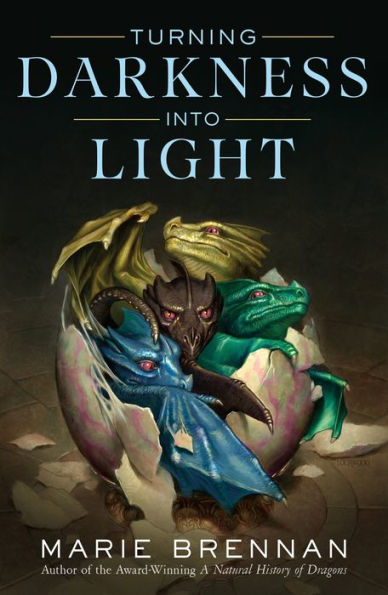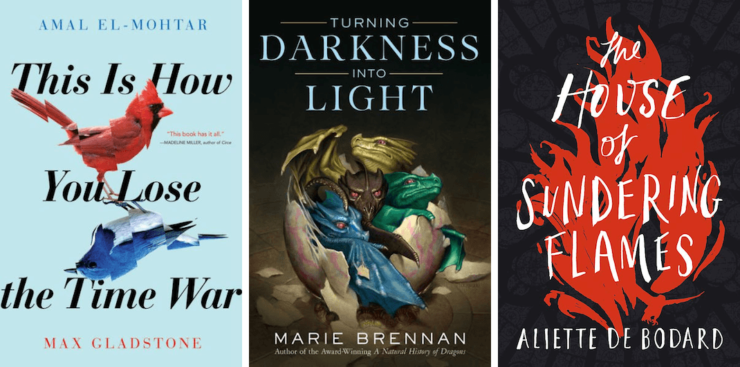A little while has passed since my last column, and I hope you’ll excuse my absence: These things rather happen, when you’re arranging your wedding (August! So soon!), applying to go back to college, and wake up one morning to the discovery that you hate everything you read.
I’ve recovered somewhat from the latter affliction, and I’m here to tell you about the books that cured me—at least for now. Have you heard of This Is How You Lose The Time War, by Max Gladstone and Amal El-Mohtar? Because this novella—an epistolary romance between agents on opposite sides of a totalising war, an exchange of letters that starts as a boast on the battlefield and grows into something fierce and affecting and strange, that ends in a kind of transcendence—is the queer time-travelling romance I didn’t know I needed. But it turns out (holy shit guys, HOLY SHIT) that I’ve been looking for something like this all my life. It’s a precise and elegant delight, just long enough to earn its occasional moments of self-indulgence, and I adore it. There’s no way I can talk about it with any pretence of critical distance. Read it! Read it! It’s great!
Ahem. I’ll hold myself back from the capslock of enthusiasm.
Buy the Book


Turning Darkness Into Light
I’ll try to do the same for Marie Brennan’s Turning Darkness Into Light (simultaneously published this August by Titan Books in the UK and Tor Books in the US), a delightful next-generation sequel to Brennan’s “Memoirs of Lady Trent” series (A Natural History of Dragons and its sequels). Audrey Camherst is the granddaughter of Isabella, Lady Trent. Her father is a renowned oceanographer, her mother a celebrated astronomer, and she herself has followed in the footsteps of her step-grandfather Suhail to specialise in the archaeological and philological study of ancient Draconean civilisation. She feels the pressure of her family name, and the desire to make a name for herself independent of her family’s accomplishments. And though she’s very accomplished in her chosen field, she’s still quite young.
When Lord Glenleigh, a (less than entirely ethical) collector of antiquities, recruits Audrey to decipher a series of ancient tablets which present the first known long-form narrative from the ancient Draconean civilisation, she couldn’t be expected to anticipate that her research would lead her to a conspiracy designed to hurt those she considers friends. For an international gathering to decide the fate of the ancient Draconeans’ modern descendents (who are confined to a tiny, isolated region, largely inaccessible to humans) is in the offing, and the tablets’ portrayal of ancient Draconeans will have a significant effect, one way or another, on public opinion for the coming Falchester Congress.
This is a novel about a translation, and about the process of translation, as well as about a conspiracy and coming-of-age. It’s told in diary entries and letters and newspaper reports and the translation itself. It has footnotes and squabbles over etymology and arguments over the historicity of myth, and Brennan appears to be absolutely revelling in the sheer archaeology/philology geekiness of her work. As a historian of antiquity myself, this book couldn’t have been better designed to make me gleeful: It’s completely delightful. Looted antiquities! Forged antiquities! The ethics of collecting! Shady dealers in antiquities getting their comeuppance! The modern use, will-ye nil-ye, of narratives about the ancient world! I just want to roll around in it.
Brennan brings a distinctive voice to each of her characters and their diaries or letters, and builds tension in her gradual revelation both of the translated text and drip-drop of implication about the conspiracy with a masterful touch. This is a compelling and readable novel, and damn did I enjoy the hell out of it.
Also in damn did I enjoy the hell out it territory: Aliette de Bodard’s The House of Sundering Flames, sequel to The House of Binding Thorns and capstone to the series that began with The House of Shattered Wings. De Bodard builds on the characters and themes she introduced in the previous two volumes (and associated short works) to create a stunning masterpiece of a conclusion. (Yes, I’m a fan. But it’s bloody good.) If you enjoyed the other books in this series, you should definitely not miss out on this one.
Liz Bourke is a cranky queer person who reads books. She holds a Ph.D in Classics from Trinity College, Dublin. Her first book, Sleeping With Monsters, a collection of reviews and criticism, was published in 2017 by Aqueduct Press. It was a finalist for the 2018 Locus Awards and was nominated for a 2018 Hugo Award in Best Related Work. Find her at her blog, where she’s been known to talk about even more books thanks to her Patreon supporters. Or find her at her Twitter. She supports the work of the Irish Refugee Council, the Transgender Equality Network Ireland, and the Abortion Rights Campaign.










